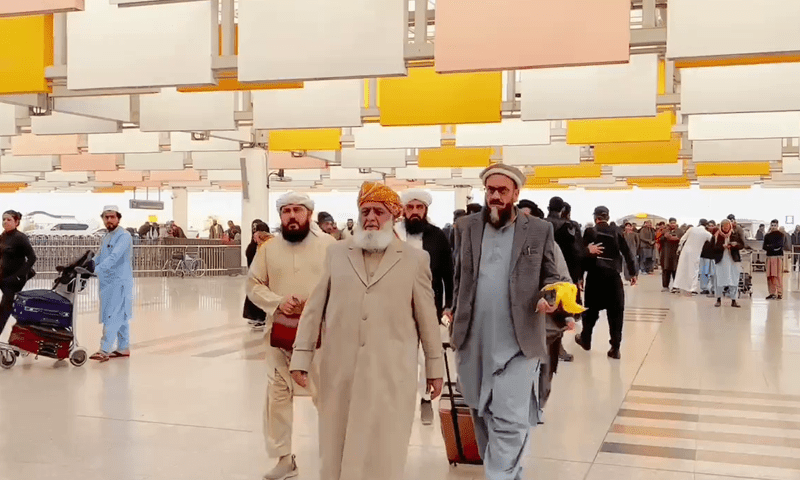In a notable development, Maulana Fazl-ur-Rehman, leader of Pakistan’s Jamiat Ulema-e-Islam party, held an exclusive meeting with Hibatullah Akhundzada, the supreme leader of the Taliban government, in Kandahar. This encounter is particularly significant due to Akhundzada’s renowned reticence in interacting with foreign delegations.
BBC Pashto has reported that Fazl-ur-Rehman specifically traveled to Kandahar on Wednesday for this meeting. Sources in Kandahar have confirmed its occurrence to BBC Pashto, although the specifics of the discussions remain under wraps. Zabihullah Mujahid, a Taliban government spokesperson, has not offered any comment on this development.
Previous reports had cast doubt on the likelihood of such a meeting taking place.
Highlighting its importance, Fazl-ur-Rehman is only the second foreign leader known to have met with the Taliban’s supreme leader, following a meeting between Akhundzada and Qatari Prime Minister Mohammed bin Abdulrahman Al Thani in Kandahar last year in May.
Maulana Fazl-ur-Rehman’s arrival in Kabul last Sunday, leading a delegation, has been a subject of much discussion. BBC Pashto quotes an anonymous Taliban official in Balkh saying that Yusuf Wafa, a close associate of the Taliban’s leadership and former governor of Kandahar, oversaw the meeting’s preparations.
In a prior meeting with the Taliban’s Prime Minister Mullah Mohammad Hassan Akhund, Fazl-ur-Rehman underscored the primary goal of his visit: to dispel misunderstandings in relations between the two countries. He expressed a message of goodwill and hope for positive developments from the visit. Zabihullah Mujahid also relayed the Taliban Prime Minister’s assurance to the Pakistani delegation of Afghanistan’s commitment to not harm any country, including Pakistan.
Other Taliban sources have also confirmed Fazl-ur-Rehman’s meeting with Hibatullah Akhundzada in Kandahar, describing it as a private discussion between the two leaders.
While Pakistani media have covered Fazl-ur-Rehman’s meeting with the Taliban’s supreme leader, Taliban government officials have yet to comment on it officially.
This meeting comes at a crucial juncture amidst escalating tensions in Afghanistan-Pakistan relations.
Issues such as the strengthening of the Pakistani Taliban (TTP), an uptick in attacks within Pakistan, the forced repatriation of undocumented Afghan refugees, and trade disputes have aggravated relations between the two countries.
Some political analysts in Pakistan view Fazl-ur-Rehman’s visit and dialogues with the Taliban leadership as potential stepping stones towards fortifying ties and resolving mutual concerns. The Taliban officials’ silence on the meeting adds an element of intrigue, signifying its sensitive nature within the larger geopolitical context.
Fazl-ur-Rehman’s Ties with the Afghan Taliban
Fazl-ur-Rehman, a staunch supporter of the Afghan Taliban, has consistently advocated for their cause against the former Western-backed Afghan Republic and the U.S.-led coalition forces. His support, apparently anchored in his dedication to Islamic values and Sharia law, contrasts with his stance on the Tehreek-e-Taliban Pakistan (TTP), which he opposes.
The dynamic between Rehman and the Afghan Taliban is notably significant within the framework of Afghanistan-Pakistan relations. His visit to Kabul, the first since the Taliban’s ascendancy in August 2021, was met with enhanced security and elicited diverse reactions from the Afghan populace. His known pro-Taliban views have sparked backlash and resentment on Afghan social media.
Despite the controversy, Rehman’s visit may be pivotal in mending Afghan-Pakistani ties. His historical political and religious influence, tracing back to his support of the Mujahideen during the Soviet invasion, positions him as a key mediator between the two nations.
However, the visit does not guarantee mission success, given the complex and longstanding Afghan Taliban-TTP relationship. Rehman faces the challenge of convincing the Afghan Taliban to help Pakistan counter the TTP threat. The Taliban consistently refutes Pakistani allegations of providing safe havens to the TTP, highlighting the nuanced and challenging regional political landscape and the intertwined interests and ideologies of these groups.
Further details are anticipated to emerge, potentially shedding light on the implications of this high-level interaction for the regional dynamics and easing tensions between the Taliban government in Afghanistan and the Pakistani establishment.





